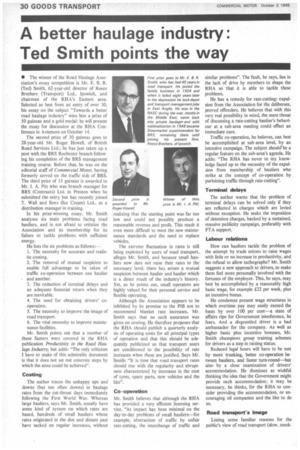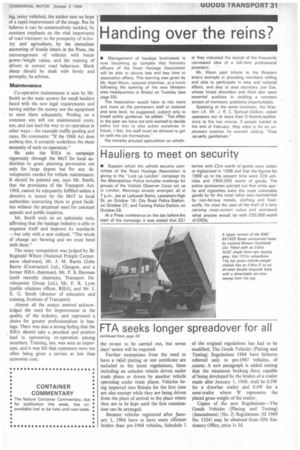A better haulage industry: Ted Smith points the way
Page 32

Page 33

If you've noticed an error in this article please click here to report it so we can fix it.
• The winner of the Road Haulage Association's essay competition is Mr. E. B. R. (Ted) Smith, 62-year-old director of Reece Brothers (Transport) Ltd., Ipswich, and chairman of the RHA's Eastern area. Selected as best from an entry of over 30, his essay on the subject "Towards a better road haulage industry" wins him a prize of 50 guineas and a gold medal: he will present the essay for discussion at the RHA Conference in Aviemore on October 14.
The second prize of 30 guineas goes to 28-year-old Mr. Roger Howell, of British Road Services Ltd.; he has just taken up a post with the BRS Rochester branch following his completion of the BRS management training course. Before that, he was on the editorial staff of Commercial Motor, having formerly served on the traffic side of BRS. The third prize of 15 guineas is awarded to Mr. I. A. Pitt who was branch manager for BRS (Contracts) Ltd. in Preston when he submitted the entry but has recently joined T. Wall and Sons (Ice Cream) Ltd.. as a distribution manager in training.
In his prize-winning essay, Mr. Smith analyses six main problems facing road hauliers, and is not afraid to criticize the Association and its membership for its failure to tackle problems with sufficient energy.
He lists the six problems as follows: 1. The necessity for accurate and realistic costing.
2. The removal of mutual suspicion to enable full advantage to be taken of traffic co-operation between one haulier and another.
3. The reduction of terminal delays and an adequate financial return when they are inevitable.
4. The need for obtaining drivers' cooperation.
5. The necessity to improve the image of road transport.
6. The vital necessity to improve maintenance facilities.
Mr. Smith points out that a number of these factors were covered in the RHA publication Productivity in the Road Haulage Industry, but adds: "The only criticism I have to make of this admirable document is that it does not set out concrete steps by which the aims could be achieved".
Costing
The author traces the unhappy ups and downs (but too often downs) in haulage rates from the cut-throat days immediately following the First World War. Whereas large hauliers, says Mr. Smith, usually have some kind of system on which rates are based, hundreds of small hauliers whose rates originated in the dim and distant past have tacked on regular increases, without realizing that the starting point was far too low and could not possibly produce a reasonable revenue and profit. This made it even more difficult to meet the new maintenance standards and the need to replace vehicles.
The extreme fluctuation in rates is still being exploited by users of road transport,. alleges Mr. Smith, and because small hauliers now dare not raise their rates to the necessary level, there has arisen a mutual suspicion between haulier and haulier which is a direct result of the industry's history. Yet, as he points out, small operators are highly valued for their personal service and flexible operating.
Although the Association appears to be inhibited by its promise to the PIB not to recommend blanket rate increases, Mr. Smith says that no such assurance was given on costing. He therefore proposes that the RHA should publish a quarterly analysis of operating costs for all principal types of operation and that this should be adequately publicized so that transport users are conditioned to the possibility of rate increases when these are justified. Says Mr. Smith: "It is time that road transport rates should rise with the regularity and abruptness characterized by increases in the cost of tyres, spare parts, new vehicles and the like".
Co–operation
Mr. Smith believes that although the RHA has provided a very efficient licensing service, "its impact has been minimal on the day-to-day problems of small hauliers—for example, abstraction of traffic by unfair rate-cutting, the interchange of traffic and similar problems". The fault, he says, lies in the lack of drive by members to shape the RHA so that it is able to tackle these problems.
He has a remedy for rate-cutting: expulsion from the Association for the deliberate, proved offenders. He believes that with this very real possibility in mind, the mere threat of discussing a rate-cutting haulier's behaviour at a sub-area meeting could effect an immediate cure.
Traffic co-operation, he believes, can best be accomplished at sub-area level, by an intensive campaign. The subject should' be a regular feature on the sub-area's agenda. He adds: "The RHA has never to my knowledge faced up to the necessity of the expulsion from membership of hauliers who strike at the concept of co-operation by purloining traffic through rate-cutting".
Terminal delays
The author warns that the problem of terminal delays can be solved only if they are reflected in charges which are levied without exception. He seeks the imposition of detention charges, backed by a sustained, massive publicity campaign, preferably with FTA support
Labour relations
How can hauliers tackle the problem of the attempt by trade unions to raise wages with little or no increase in productivity, and the refusal to allow tachographs? Mr. Smith suggests a new approach to drivers, to make them feel more personally involved with the fortunes of the employer. This, he says, may best be accomplished by a reasonably high basic wage, for example £22 per week, plus an incentive bonus.
He condemns present wage structures in which overtime pay may easily exceed the basic by over 100 per cent—a state of affairs ripe for Government interference, he fears. And a disgruntled driver is a bad ambassador for the company. As well as higher basic plus incentive bonuses, Mr. Smith champions group training schemes for drivers as a step in raising status.
Reduced legal hours will have to be met by more trunking, better co-operation between hauliers, and faster turn-round—but also by a close examination of drivers' accommodation. He dismisses as wishful thinking the idea that the Government might provide such accommodation; it may be necessary, he thinks, for the RHA to consider providing the accommodation, or encouraging oil companies and the like to do SO.
Road transport's image
Listing some familiar reasons for the public's view of road transport (slow, smok
ing, noisy vehicles), the author sees no hope of a rapid improvement of the image. But he believes it can be constructively tackled, by constant emphasis on the vital importance of road transport to the prosperity of in du stry and agriculture, by the immediate answering of hostile letters in the Press, the encouragement of vehicles with better power /weight ratios, and the training of drivers in correct road behaviour. Black sheep should be dealt with firmly and promptly, he advises.
Maintenance Co-operative maintenance is seen by Mr. Smith as the main answer for small hauliers faced with the new legal requirements and having neither the money nor the equipment to meet them adequately. Pooling on a common site will cut maintenance costs, too, and can lead the way to co-operation in other ways—for example traffic pooling and rates. He comments: "If the 1968 Act does nothing else, it certainly underlines the sheer necessity of such co-operation."
He asks the RHA to campaign vigorously through the MoT for local authorities to grant planning permission not only for large depots but for any developments needed for vehicle maintenance. It should be pointed out, says Mr. Smith, that the provisions of the Transport Act, 1968, cannot be adequately fulfilled unless a directive is issued by the MoT to local authorities instructing them to grant facilities without the perpetual need for constant appeals and public inquiries.
Mr. Smith ends on an optimistic note, affirming that the haulage industry is able to organize itself and improve its standards —but only with a new outlook. "The winds of change are blowing and we must bend with them."
The essay competition was judged by Sir Reginald Wilson (National Freight Corporation chairman), Mr. I. M. Barrie (John Barrie (Contractor) Ltd., Glasgow, and a former RHA chairman), Mr. P. S. Henman (until recently chairman, Transport Development Group Ltd.), Mr. F. R. Lyon (public relations officer, RHA), and Mr. J. E. G. Smith (director of education and training, Institute of Transport).
Almost all the essays entered acknowledged the need for improvement in the quality of the industry, and expressed a desire for greater professionalism in haulage. There was also a strong feeling that the RHA should take a practical and positive lead in sponsoring co-operation among members. Training, too, was seen as important, and it was felt that customers were too often being given a service at less than economic cost.




































































































































